Premium Only Content
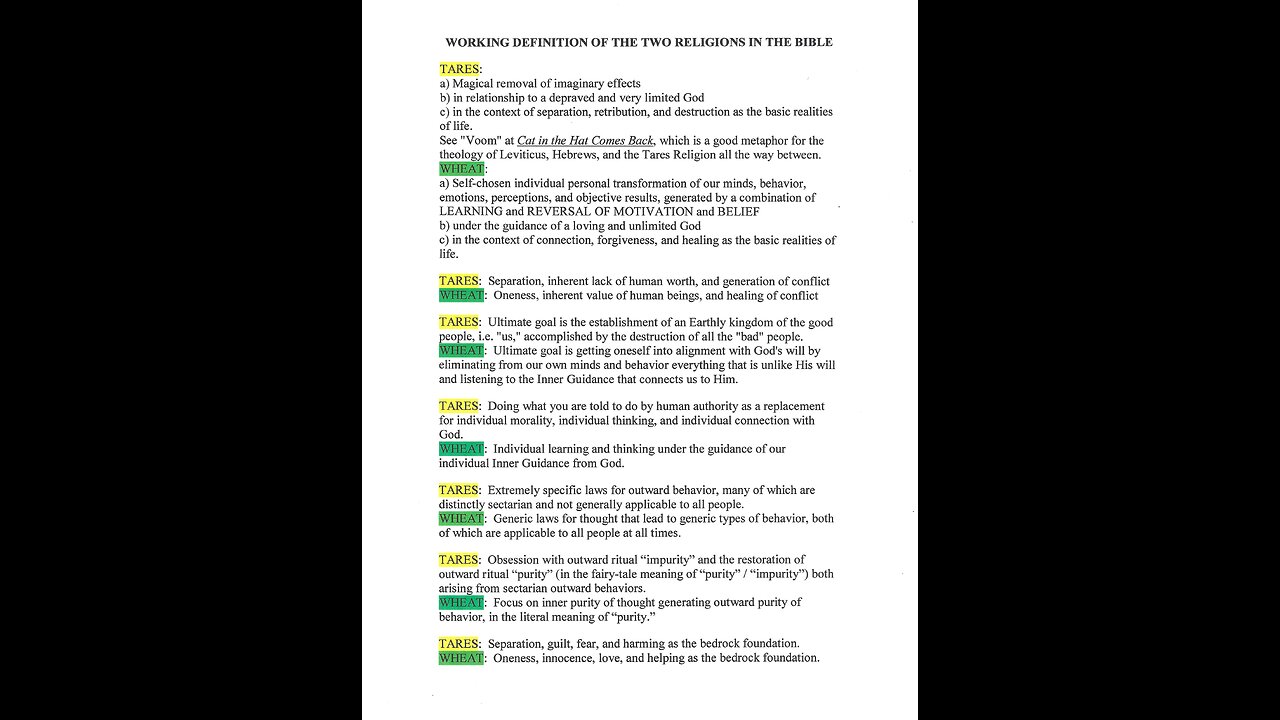
41st session. 1-3-24. FUNDAMENTALS OF READING THE BIBLE
NOTES ON THE 1-3-24 CLASS
>> I think this was a VERY important class with ideas on reading the Bible (especially for beginners) that you won’t hear anywhere else. Some of those ideas were the contrast between the epistles and Matthew on what became orthodox Christian salvation theology, ideas on picking a translation, recommended order of reading the books of the Bible, the unique weaknesses of each gospel, and an overview of the books of the Tanakh. I recommend that those who were not in class watch the recording. If you were in class, I recommend watching it again to ingrain the ideas in your mind. The corrections noted below are important.
>> Due to a Zoom failure, the screen is blank from 1:16:57 to 1:21:32, but the table I intended to display does show up from 1:21:32.
>> From 1:44:20 we had about twenty minutes of open discussion that was not recorded, after which I resumed recording.
>> Doug’s metaphor of a puzzle during the final 60 seconds is profoundly important.
CORRECTIONS TO MY STATEMENTS AT THE 1-3-24 CLASS
>> At 54:50 to 54:54, “no human sacrifice there or at any point after” should have been “no valid human sacrifice there or at any point after.”
>> From 1:07:20 to 1:15:27, with regards to the order in which to read the gospels, I should have said to read the Gospel of Thomas at any point after Mark and preferably before Luke. I would also advise reading Jonathan Livingston Seagull and Illusions, both by Richard Bach, as possibly the two best books aside from ancient books to obtain insight into Jesus and the meaning of his teachings.
>> From 1:19:30 to 1:19:34, I was mistaken in my statement that both Leviticus and Numbers are “pretty much all [from] P.” For Leviticus that statement is true, but Numbers, like Genesis and Exodus, is a combination of J, E, and P. See “Additional References” (below) for my source.
>> From 1:22:28, “Isaiah and Jeremiah coming in close second” should have been “Isaiah and Jeremiah coming in close sixth and seventh.”
>> From 1:38:20, “… the story as told in the book of 2 Kings … they commence fanatical animal sacrifice.” This correction is an important example of three principles. The first principle is that one reason why I try to provide in this series of emails the book/chapter/verse references for what I said in class is that it forces me to make sure what I said was right. The second is that the books of 1 and 2 Chronicles are propaganda made by the priests as a replacement for and distortion of the Deuteronomistic History. The third is that the purpose of the books of Chronicles was to support the Tares Religion. In my statement I was conflating the accounts of the reforms of Josiah in 2 Kings and 2 Chronicles. In 2 Kings 23:21-23 the story is only that the Passover was kept for the first time since the days of the judges, which means for the first time since the Israelites crossed the Jordan almost eight hundred years earlier. As would be expected from the author of Deuteronomy (which says almost nothing about sacrifice) and Jeremiah (which is opposed to sacrifice), there is no mention of sacrifice per se and no mention of the priests or Levites as being involved in the Passover. In 2 Chronicles 35:1-19 the original story is distorted into a long discussion of the role of the priests and of the sacrifice, at that one Passover, of a total of 44,100 animals. This is an example of what I can not overemphasize for anyone who wants to read the Bible: Like much of Leviticus and other passages that come from the P document, the books of Chronicles are start to finish garbage written for the purpose of establishing the Tares Religion as the replacement for the Wheat Religion – there was no intention of telling the truth in the minds of the authors.
>> From 1:39:33, “… that history, which is the great bulk of the history in the Bible,” should have been “… that history, which is the great bulk of the meaningful history in the Protestant 'Old Testament.' " The first four books contain myths and legends, not meaningful history; the books of Chronicles have no claim at all to being history; and the books of Maccabees are not found in the Protestant canon.
>> At 1:39:56-57. Based on the correction noted above, I realize that 2 Kings 22-23 is not saying that they found a fraudulent book, and in fact the story in 2 Kings would fit with their having found Deuteronomy.
>> From 1:44:15 "read the Bible first" should have been "read the gospels first."
ADDITIONAL REFERENCES FOR THE 1-3-24 CLASS
>> Recording from 19:44 to 23:06. With regards to ritual purity in ancient Jewish religion, the source I mentioned is the course titled “Jesus and His Jewish Influences,” by Professor Jodi Magness, Ph.D., a professor at UNC-CH. This course is 24 thirty-minute lectures and is one of many excellent courses at The Great Courses, www.thegreatcourses.com. I think most of the content I referred to is from lectures 5, 13, and 23.
>> From 24:52: “An eye for an eye and a tooth for a tooth” is quoted by Jesus at Matthew 5:38. The Tanakh references include Exodus 21:24, Leviticus 24:20, and Deuteronomy 19:21.
>> From 25:54, Jesus’ statement “Blessed are the peacemakers” is from Matthew 5:9.
>> From 41:10, Jesus’ statement containing “in spirit and in truth” is at John 4:19-24.
>> From about 55:55, my reference is to sacrifices to Molech as recorded in the Tanakh, which appear to have included child sacrifice. Bible verses include Leviticus 20:2, Leviticus 20:3, Leviticus 20:4, Leviticus 20:5, 1 Kings 11:7, 2 Kings 23:10, and Jeremiah 32:35.
>> From 1:19:08 to 1:19:34, the comments with regards to the documents from which Genesis, Exodus, Leviticus, and Numbers were constructed is from the Appendix of Who Wrote the Bible, by Richard Elliott Friedman, published by Simon and Schuster, © 1987.
>> From 1:37:35, the “discovery” of a book attributed to Moses is from 2 Kings chapter 22.
>> From 1:38:40 I said “Deuteronomy barely even ever mentions sacrifice.” I’m currently reading through Deuteronomy to find to what extent it mentions sacrifice. With 13 of 34 chapters left to read, I have found only one brief reference, at 27:4-7, to sacrifice. A search of the NKJV at Biblegateway found additional cases of “offerings” only at brief passages in chapters 12 and 18.
>> From 1:36:50 to 1:37:56. The references to the book given by Moses having been lost for so long that no one in power even knew that there ever had been a book from Moses is from 2 Kings 22:3-20.
-
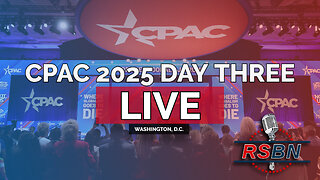
Right Side Broadcasting Network
5 days agoLIVE REPLAY: CPAC 2025 Day Three with President Donald J. Trump - 2/22/25
224K74 -
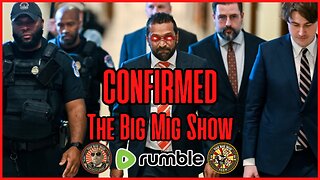 1:05:34
1:05:34
The Big Mig™
9 hours agoConfirmed Kash Patel New FBI Director, Bring On The Pain |EP483
27.1K13 -
 53:59
53:59
Tactical Advisor
5 hours agoThe Vault Room Podcast 009 | Everyone Getting $5000?!
30.1K6 -
 2:04:44
2:04:44
TheAlecLaceShow
16 hours agoLive at CPAC | Interviews with Dean Cain, Rep. Comer and more! | The Alec Lace Show
41.3K3 -
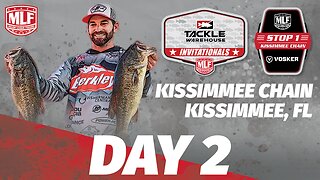 LIVE
LIVE
Major League Fishing
2 days agoLIVE Tackle Warehouse Invitationals, Stop 1, Day 2
253 watching -
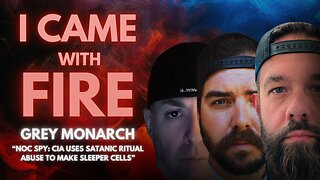 3:12:37
3:12:37
I_Came_With_Fire_Podcast
13 hours agoNOC Spy: CIA uses SATANIC RITUAL ABUSE to make SLEEPER Cells
29.4K5 -
 28:42
28:42
CatfishedOnline
1 day ago $1.67 earnedWoman Insists Morgan Wallen Relationship Isn't a Romance Scam!
24.6K -
 16:25
16:25
TSPLY
1 day agoNew CNN / MSNBC Meltdown Moments Of Getting Mad At Donald Trump In February
30.8K22 -
 8:33
8:33
scoutthedoggie
6 hours agoAirsoft War Games Scotland
45.8K5 -
 4:56
4:56
Kirill MultitoolOfficial
1 day ago $3.35 earnedSurvival TIPS and usefull bushcraft DIY in the wild
53.5K3